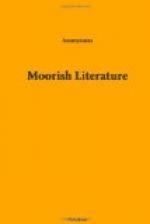“The forts that surround Algiers
like stars,
Are bereft of their masters;
The baptized ones have entered.
The Christian religion now is triumphant,
O my eyes, weep tears of blood, weep evermore!
“They are beasts of burden without
cruppers,
Their backs are loaded,
Under a bushel their unkempt heads are
hidden,
They speak a patois unintelligible,
You can understand nothing they say.
“The combat with these gloomy invaders
Is like the first ploughing of a virgin
soil,
To which the harrowing implements
Are rude and painful;
Their attack is terrible.
“They drag their cannons with them,
And know how to use them, the impious
ones;
When they fire, the smoke forms in thick
clouds:
They are charged with shrapnel,
Which falls like the hail of approaching
spring.
Unfortunate queen of cities—
City of noble ramparts,
Algiers, column of Islam,
Thou art like the habitation of the dead,
The banner of France envelops thee all."[6]
[6] Hanoteau, pp. 2, 3, 5, 7, 9, 11.
It is, one may believe, in similar terms that these songs, lost to-day, recount the defeat of Jugurtha, or Talfarinas, by the Romans, or that of the Kahina by the Arabs. But that which shows clearly how rapidly these songs, and the remembrance of what had inspired them, have been lost is the fact that in a poem of the same kind on the same subject, composed some fifty years ago by the Chelha of meridional Morocco, it is not a question of France nor the Hussains, but the Christians in general, against whom the poet endeavors to excite his compatriots.
It is so, too, with the declamatory songs of the latest period of the Middle Ages, the dialects more or less precise, where the oldest heroic historical poems, like the Song of Roland, had disappeared to leave the field free for the imagination of the poet who treats the struggles between Christians and Saracens according to his own fantasy.
Thanks to General Hanoteau, the songs relating to the principal events of Khabyle since the French conquest have been saved from oblivion, viz., the expedition of Marechal Bugeaud in 1867; that of General Pelissier in 1891; the insurrection of Bon Bar’la; those of Ameravun in 1896, and the divers episodes of the campaign of 1897 against the Aith Traten, when the mountains were the last citadel of the Khabyle independence:
“The tribe was full of refugees,
From all sides they sought refuge
With the Aith Traten, the powerful confederation.
‘Let us go,’ said they, ‘to
a sure refuge,’
For the enemy has fallen on our heads,’
But in Arba they established their home."[7]
[7] Hanoteau, p. 124.
The unhappy war of 1870, thanks to the stupidity of the military authorities, revived the hope of a victorious insurrection. Mograne, Bon Mazrag, and the Sheikh Haddad aroused the Khabyles, but the desert tribes did not respond to their appeal. Barbary was again conquered, and the popular songs composed on that occasion reproached them for the folly of their attempt.




